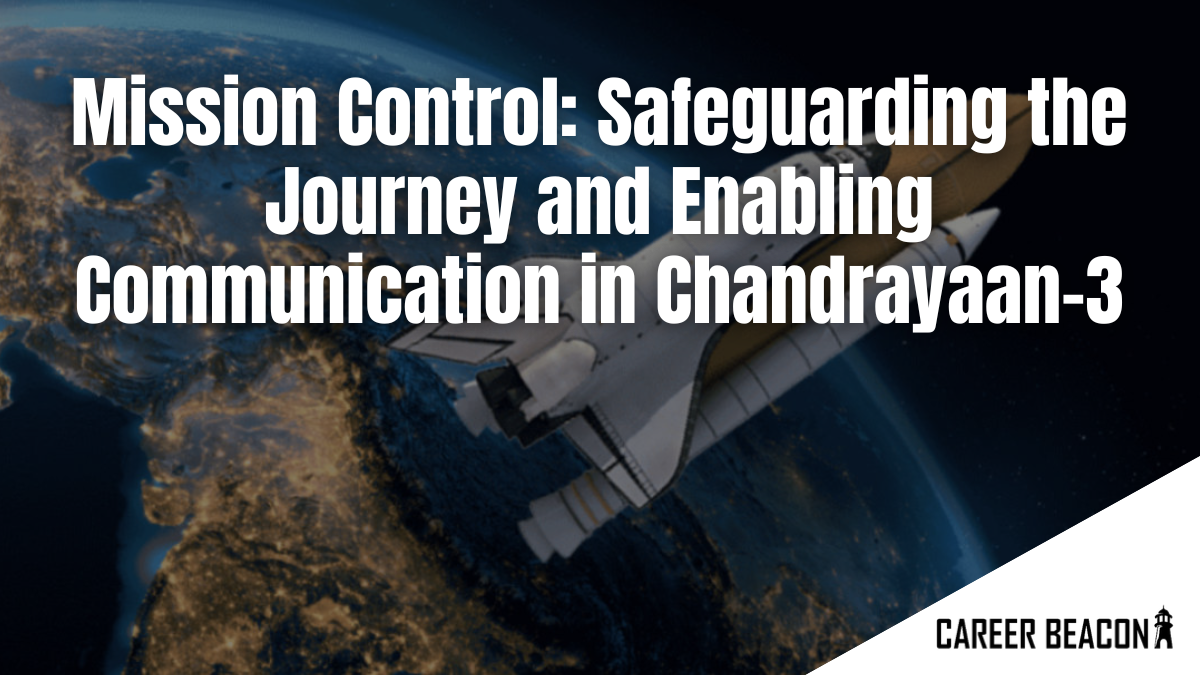
Mission Control: Safeguarding the Journey and Enabling Communication in Chandrayaan-3
Mission control professionals are the backbone behind the success of space missions like Chandrayaan-3. In addition to managing communications, they also keep a close eye on the spacecraft throughout its journey, ensuring everything runs safely and efficiently. Let’s dive in to better understand their tasks and duties.
Mission control experts continuously monitor the spacecraft’s systems, instruments and telemetry data in real time. Closely observing a range of factors, they promptly detect any anomalies or variations from the expected functioning, ensuring the mission can remain safe.
Mission Control professionals are accountable for locating unorthodox system performance or technical problems. Working with spacecraft engineers, they analyse issues and create solutions, guaranteeing that the spacecraft’s systems function reliably and securely during the mission.
Risk Management
Mission control personnel are entrusted with spotting and dealing with potential risks during a mission. The process includes risk assessment, considering elements such as space debris, solar activity, and radiation to prevent any harm to the spacecraft. Doing so enhances security and boosts the chances of success for the mission.
Preparing for the unexpected is a vital part of mission control. Professionals in this role create contingency plans to address potential system breakdowns, emergencies, or critical events in the mission. These plans explain how to recover the spacecraft, add redundancies, and devise alternative mission strategies. By having comprehensive contingency plans, mission control can act quickly to ANY situation that arises, reducing mission disruptions and maintaining safety onboard.
Mission control professionals oversee the communication links between the spacecraft and ground control. They monitor signal strength, manage data transmission protocols, and troubleshoot any issues to maintain uninterrupted communication. Through their expertise, mission control enables effective communications with the spacecraft throughout its voyage.
Mission control professionals strive to ensure the success of a mission through coordination with scientists, engineers, and satellite communication specialists. Clear communication is necessary for effective decision-making, troubleshooting, and adapting to changing mission needs. They collaborate closely with team members to guarantee a smooth operation.
Overall, mission control professionals are indispensable for securing the journey of spacecraft such as Chandrayaan–3. They use their ability to monitor real-time situations, identify discrepancies, manage risks, make backup plans, and control communication networks to ensure the mission runs safely and successfully. Their expertise and commitment are essential contributions that aid in the smooth operation of these crafts and fulfil scientific aims.
Becoming a professional in mission control and communication systems related to space exploration, such as Chandrayaan-3, typically includes specific steps. These range from formal education or training to learning about technology and industry. Working experience and continued education are also necessary to succeed in this field.
Begin by obtaining a bachelor’s degree in an applicable area such as aerospace engineering, electrical engineering, or another related subject. Concentrate on classes that include spacecraft systems, mission planning, astrodynamics, communication systems, and risk management.
Gain Experience
Search for internships or research opportunities at space agencies, aerospace companies, or research institutions. This firsthand knowledge will allow you to work with mission operations, data analysis, and communication systems management.
To further your mission control expertise, consider pursuing a master’s degree or higher education in a space-related specialisation such as mission planning, space systems engineering, or satellite communications. This advanced education will broaden your knowledge and understanding of key concepts involved in mission control.
Engage in ongoing professional development by attending conferences, seminars, and training programs related to space operations, mission command, and communication networks. Keep abreast of the latest innovations and technologies in the area.
Entry-Level Positions
Kickstart your career by launching into entry-level roles in space agencies, aerospace companies, and mission control centres. You could be a mission operations engineer, spacecraft systems analyst, or communication systems specialist. Get hands-on experience conducting real-time mission monitoring, data analysis, and communication systems management.
As you develop your knowledge and expertise, your career can advance to more advanced mission control and communication systems roles. Acquire the necessary skills for positions such as mission planning lead, mission control team lead, or communication systems manager and display proficiency in mission operations and coordination.
By honing your skills in a particular subject, you can gain the ability to take charge and become an authority figure in mission control or related systems. Consider focusing on risk management, satellite communications, or advanced data analysis. This will enable you to hold managerial responsibilities or be seen as an expert.
Increasing your knowledge and capabilities is critical to advancing in the mission control and communication systems field. Investing the effort to stay informed of advancements in space exploration, mission control technologies, and communication systems is vital. Professional development opportunities, certifications, and pursuing higher education are all ways to expand your skill set and improve your prospects for career advancement.
It’s essential to remember that your career trajectory could differ depending on the company and the nation you operate in. Networking, forging relationships in the industry, and being proactive about seeking out openings for growth and advancement in mission control and communication systems will all be instrumental for a successful career.


